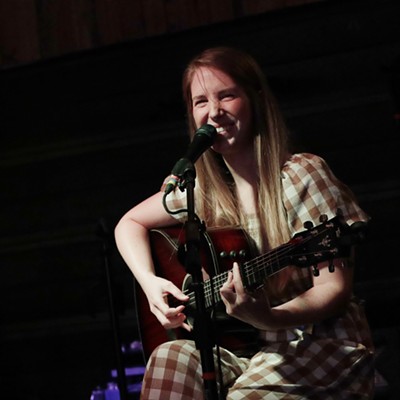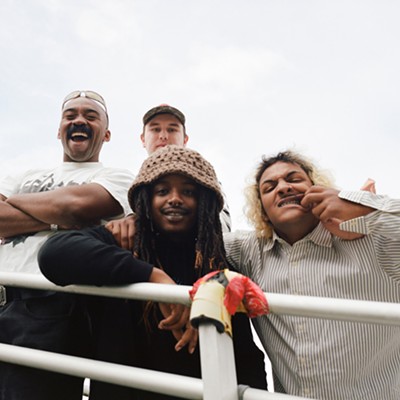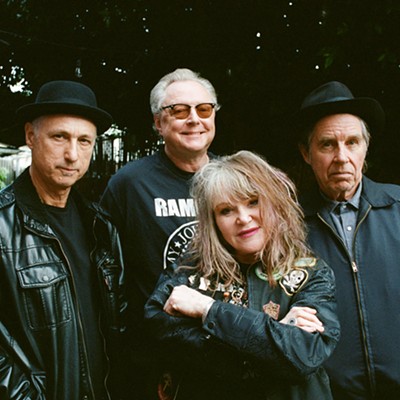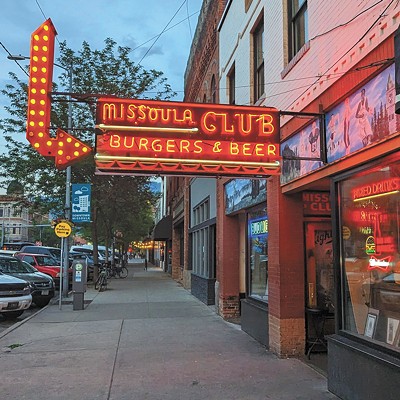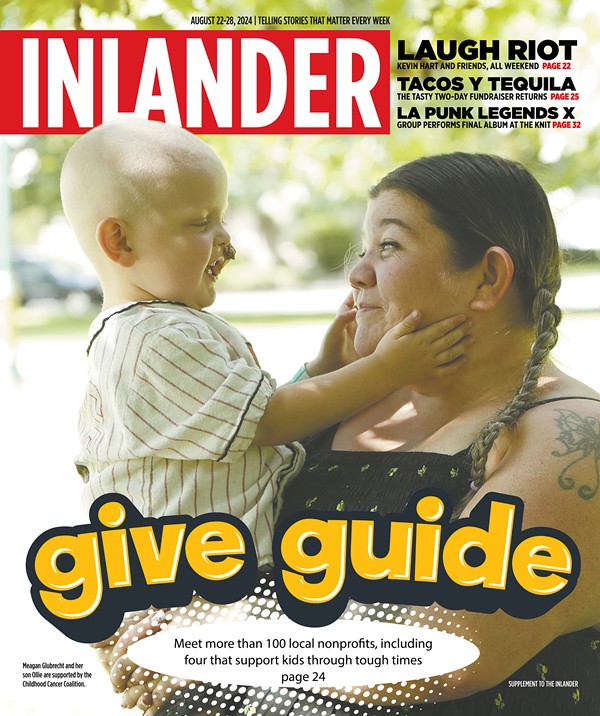Such is the weird state of the music business that the Fleshtones' new album, Face of the Screaming Werewolf, debuted in the Top 10 of Billboard's "Alternative New Artist Albums Chart" well before the record was widely released last week, and a mere 45 years after the band's first public gig.
The Fleshtones are definitely not "new," and if "alternative" means rock music designed for fans with no fear of hitting the dance floor, then sure, call them alternative. The fact that Face of the Screaming Werewolf could land on any sales chart based only on its limited Record Store Day release in fall 2020 says a lot about both the power of RSD marketing and how few people actually buy full albums anymore.
Haven't heard of the Fleshtones? Not a shock. They're a classic "they shoulda been huge!" band for anyone who's been lucky enough to discover them. And they had plenty of opportunities to break through, especially early on.
That first gig in 1976? It was at CBGB in their native New York City, the dive that helped launch the careers of Talking Heads, Ramones and Blondie. Fleshtones shared stages with all of them, and shared rehearsal space with the Cramps. They spent the better part of the '80s on I.R.S. Records, the label that shepherded the likes of the Go-Go's and R.E.M. to the mainstream. Fleshtones lead singer Peter Zaremba hosted an MTV show called I.R.S.'s The Cutting Edge for five years, showcasing the label's talent. Hell, the Fleshtones even played Dick Clark's American Bandstand and did the main soundtrack song for a Tom Hanks flick. (It was Bachelor Party, but still — Tom Hanks!)
When big-time success doesn't come after five or 10 years, most bands would quit. The Fleshtones just kept on rocking, packing shows for legendary performances, expanding active fan bases across Europe and recording a steady diet of albums in a style they call "super rock." Zaremba, on the phone from his Connecticut home, says the reason the Fleshtones continue is simple: They like what they do, and they're still getting better.
"Playing, for us, it's almost always an enjoyable thing," Zaremba says. "Sometimes it's exhausting. It takes a lot out of us — we're not shoegazers. And it's very emotional, you know. We summon up a lot for each performance. In a way, when you're done and you get off the stage, you really feel, like, purged and purified. You feel like you've done something good. You've reached people, and you've done something for them."
The last 12 months were different for the Fleshtones, like so many others. But when you've been touring every year for the better part of a half-century, it's even more strange.
"This is the first year we have not played live since we started in 1976. That says a lot," Zaremba says. "We get out. We play. We play all over the place. So it's an unusual situation for us. But we'll be ready. People are going to have to come out sooner or later, right?"
The Fleshtones started in a Queens basement when Keith Streng found the former tenants left some instruments behind. Streng picked up the guitar, recruited Zaremba from the neighborhood, and a band was born, building a sound blending garage-rock, R&B, soul, surf-rock and punk that you still hear on the new Face of the Screaming Werewolf. A couple of members have come and gone through the years (the current lineup, including drummer Bill Milhizer and bassist Ken Fox, has been together since 1990), but the band never stopped working.
Werewolf was recorded pre-pandemic, and Zaremba, now 66, says that creating it was almost pure joy.
"As we go on, the songs and everything, they're coming easier," Zaremba says, "and recording is coming easier. And we were ready to do this record.
"This is the first record in a long time when Keith and I actually sat down and wrote a bunch of songs together, which is what we did back in the I.R.S. days. We got together around this little kitchen table in Williamsburg, Brooklyn, and worked on a whole bunch of songs. We made little crude demos."
The resulting album is a set of songs that feel timeless, like they could have been on a garage-rock compilation at any time between 1960 and now. Zaremba's organ and harmonica playing are big reasons for that, as is Streng's guitar sound. Killer instrumentals like "Swinging Planet X" and "Somerset Morning" stand tall alongside the chiming "You Gotta Love, Love" and the anthemic "Violet Crumble, Cherry Ripe." The raucous "The Show Is Over" will serve as a perfect closer whenever the band is able to hit the road again.
Zaremba says a friend encouraged the band to make their version of the Rolling Stones' Some Girls. And while Zaremba could appreciate the sentiment as a big Stones fan, and saw his buddy's point about making a Fleshtones record that sounds a bit different, "we have too many ideas to be that stripped down."
"We did consciously try to not go in too many directions with one song," Zaremba allows. "I was very conscious about saying, 'No, we don't need that overdub. No, we don't know if this needs overdubs, we don't need harmony here. We only need three people clapping hands, we don't need to double clapping the hands. We got enough!'"
MEET THE FLESHTONES
Watch the documentary Pardon Us for Living, But the Graveyard's Full, streaming on Amazon Prime
Read Joe Bonomo's book Sweat: The Story of the Fleshtones, America's Garage Band
Listen to the albums like Hexbreaker! (1983), Do You Swing? (2003) or The Band Drinks for Free (2016)
The band finished the album in 2019, with plans to release it for Record Store Day last spring. Of course, that celebration of vinyl and indie record stores got pushed to fall due to COVID-19, and Werewolf is just now getting a widespread release on all formats. Zaremba sounds a little frustrated the world had to wait so long to hear it, saying, "My gut feeling is, you know, you record an album and get it out, because you never know what's gonna happen. In this case, something really happened."
As the pandemic started, the band kept rescheduling tour dates until it was clear it would be awhile before they could hit the road. And they worked on new songs, including some tunes performed in Spanish. Zaremba's also done some work on solo songs performed in French. But the call of the road for a tour supporting Werewolf, potentially including stops in the Pacific Northwest, is foremost in Zaremba's mind. Seeing the country with the band is part of why the Fleshtones started in the first place.
"To a certain degree, we got into this to be tourists," Zaremba says. "From the very first national tour. The first show was in Athens, Georgia, and we got invited to a party and met the R.E.M. guys, before they started R.E.M. We like to play, we always find a great place to eat, see the historic stuff. It's crazy not to.
"We really got into this because we're fans. Playing in a band is just an extension of our being fans of music. And when we finally get to play again, we are better than ever." ♦
The Fleshtones' Face of the Screaming Werewolf is available now in all formats.









